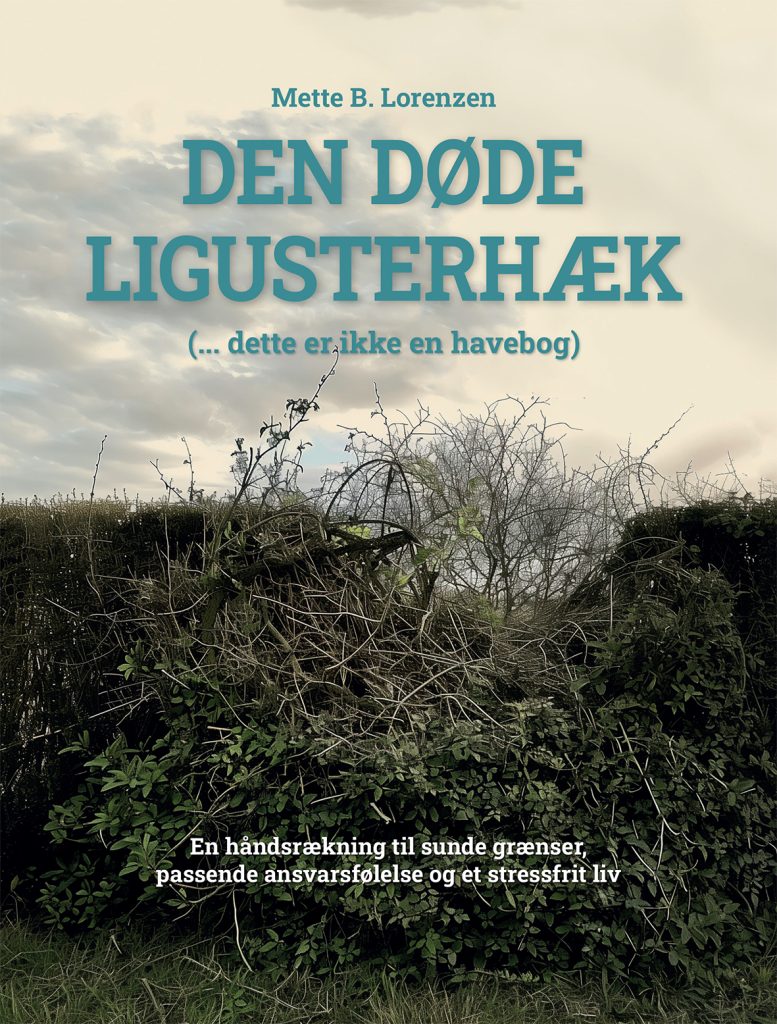RELATIONSHIPS
AND WELL-BEING

We humans are mentally and behaviourally challenged when relationships drain us. However, it is not impossible to achieve our wishes and needs to stand stronger in ourselves. If you long for a deep sense of freedom, an inner freedom to be the person you are, while also needing healthy and strong relationships with others, you should definitely read The Dead Privet Hedge by Mette B. Lorenzen. Here, you will find guidance and valuable advice. The author invites the reader into an active universe where personal well-being and the significance of our important relationships take centre stage.
Mette B. Lorenzen is, among other things, a cognitive psychotherapist MPF, coach, and mindfulness instructor.
It is both an action-oriented and reflective book that inspires and invites the reader to engage in inner work concerning personal development and boundary-setting. We are given a well-described introduction to the importance of memory in shaping our thought patterns, while the role of neuroplasticity in development and learning is also highlighted. The book presents numerous ‘tools’ in the form of reflective questions, such as in Chapter 5, which explores self-perception, self-worth, and self-confidence:
“Do you take care of yourself as well as you take care of others?” (p.73)
“Try to notice how you behave at social gatherings. If you tend to blend into the background, practise standing 20 cm further away from the wall. Prepare a few small talk phrases in advance.” (p.77)
I particularly appreciate Chapters 3, 4, and 7, as this is where Mette B. Lorenzen powerfully emphasises the importance of relational dynamics. She focuses, for example, on care and the role of parenting in the development of healthy relationships and boundaries. Although the book is rooted in the cognitive approach, it is a strength that early attachment and the development of mentalisation abilities are also included.
As I progressed through the book, I became increasingly engaged with the small, practical steps provided, which encourage the reader to reflect on the personal narratives that shape our lives and the dominant guiding principles we follow. It is essential work to dare to see oneself clearly, and Mette B. Lorenzen captures this aspect exceptionally well. The language is accessible and easy to understand. As a reader, I feel guided and supported throughout the book, which is reassuring. The structured approaches, numerous quotes, and the privet hedge as an illustrative metaphor for nurturing relationships make the book both action-oriented and inspiring. It offers readers knowledge, ideas, and inspiration to recognise new ways of thinking and acting. The quotes encourage deeper reflection, adding both depth and warmth. For example, Bear Heart:
“Just because you fall off a horse does not mean you have to stay down.”
This book is a serious and valuable contribution to how people can practise and train themselves to think differently about themselves and others. As a psychotherapist MPF, I have used this book in my work with clients while reading and reviewing it. It has served as an idea book, particularly the meditative exercises in Chapter 14, which provide tips and explanations for starting a mindfulness practice—very useful.
Although the book is written as a self-help book, it is highly recommended for professionals both to read and use. A minor criticism is the somewhat uninspiring cover image, which, in my view, does not adequately support the book’s thorough exploration of thinking and behaviour in relationships or the warm and engaging tone in which it is written.
Janne Bahn Andsager
Psychotherapist MPF
MSc in Educational Psychology
JOURNAL OF PSYCHOTHERAPY NO.1 FEBRUARY 2025